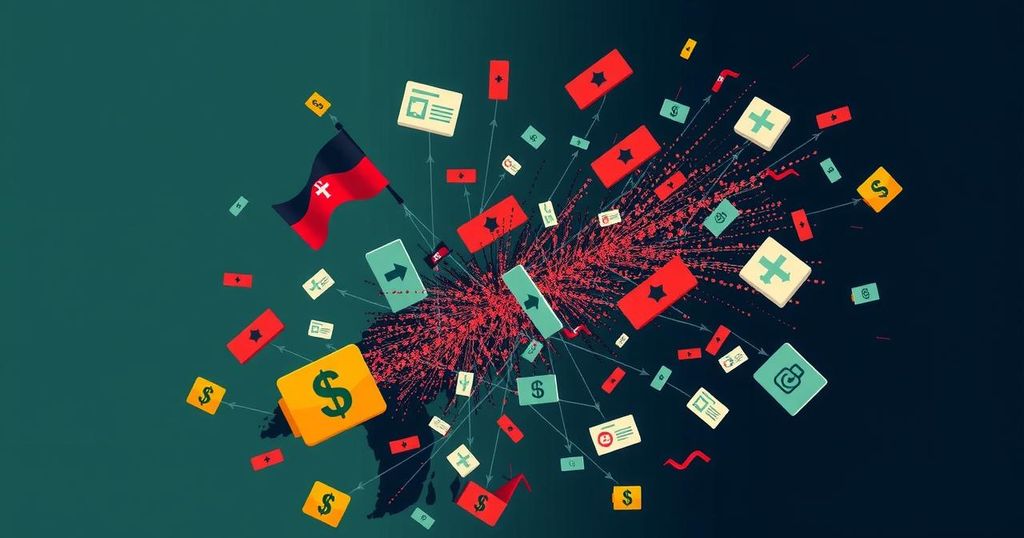The Rising Turmoil of Election Disinformation
Election disinformation is escalating, particularly as the political landscape becomes chaotic. Key factors include legal pressures on institutions, the rise of organizations promoting unfounded theories, and diminished content moderation on social media. With the involvement of public figures like Elon Musk amplifying false narratives, the spread of misinformation poses significant threats to public trust in elections. Preparedness has improved since previous cycles, yet the challenges remain daunting as election day approaches.
The current landscape surrounding election disinformation has become alarmingly chaotic, marked by a notable increase in conspiracy theories and misleading narratives. Recent events, such as the hurricanes that hit the Southeast, showcased how political figures like Donald Trump, Elon Musk, and Marjorie Taylor Greene exploited the situation to disseminate damaging misinformation. Such online chaos serves as a harbinger of what may transpire during the upcoming election period. As Elaine Godfrey, a political reporter, notes, this juncture is characterized by certain conditions that have not been as pronounced in previous elections. Noteworthy developments include legal challenges posed by prominent Republican politicians against institutions attempting to curb disinformation. For instance, the Stanford Internet Observatory has faced significant legal pressure, effectively hindering its ability to combat misinformation. In addition, organizations such as the Election Integrity Network have emerged, promoting unfounded theories that erode public trust in elections. Concurrently, major social media platforms, like X and Meta, have diminished their content moderation efforts, thereby exacerbating the spread of misinformation. Global tensions, stemming from conflicts involving countries such as Russia, Ukraine, and Iran, provide foreign actors with renewed incentives to interfere in American electoral processes. Furthermore, advancements in generative AI pose additional challenges, creating an environment ripe for disinformation tactics. Recent conspiracy theories, particularly those linked to natural disasters, lack substantial grounding in truth, with claims that seem increasingly bizarre and unfounded. The imminent election is likely to witness even more exaggerated and virulent conspiracies, especially surrounding election logistics and integrity. Elaine Godfrey emphasizes that the repercussions of such disinformation are profound, impacting FEMA’s operations during emergencies and undermining public trust in electoral systems. If left unchecked, these narratives can lead to dangerous consequences for election officials across the political spectrum, as incidents of intimidation and misinformation proliferate. The role of influential figures like Elon Musk cannot be overlooked, as their platforms contribute significantly to the dissemination of false claims and conspiracy theories. Godfrey asserts, however, that despite the challenges faced, there is a heightened awareness and preparedness compared to previous election cycles. The onus rests not only on social media companies but also on politicians to adopt a more proactive stance against the spread of misinformation. Individuals are urged to approach emotionally charged information with skepticism and to verify the credibility of sources before accepting claims as truth.
The article addresses the escalating issue of election disinformation, particularly in the context of the chaotic political environment leading up to upcoming elections. It highlights the roles of various geopolitical factors, social media dynamics, and the influence of key political figures who contribute to the spread of misleading information. The conversation focuses on the implications of such disinformation for public trust in electoral processes and the challenges faced by institutions attempting to mitigate its impact.
In conclusion, the landscape of election disinformation is poised to become increasingly chaotic, fueled by a convergence of geopolitical tensions, weakened content moderation by social media platforms, and the legal challenges faced by entities combating misinformation. The potential for dangerous misunderstandings and conspiracy theories to proliferate underscores the need for vigilance and accountability among both political leaders and media platforms. Individuals are advised to critically evaluate the information that evokes strong emotional responses, as caution is paramount in an era overshadowed by misinformation.
Original Source: www.theatlantic.com




Post Comment